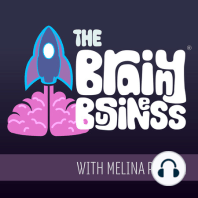53 min listen

51. Time Discounting: The I'll Start Monday Effect - My Favorite Concept!: A Behavioral Economics Foundations Episode
FromThe Brainy Business | Understanding the Psychology of Why People Buy | Behavioral Economics
51. Time Discounting: The I'll Start Monday Effect - My Favorite Concept!: A Behavioral Economics Foundations Episode
FromThe Brainy Business | Understanding the Psychology of Why People Buy | Behavioral Economics
ratings:
Length:
54 minutes
Released:
Jun 7, 2019
Format:
Podcast episode
Description
Today, we are getting back to our behavioral economics foundations episodes to discuss time discounting. I hope you enjoyed the last three episodes in our series on all the biases, where I told you about memory biases, our biases toward the future and how that impacts our decisions today, and how our selective attention and focus can color our decisions. Time discounting is one of my favorite concepts. I recently did a research project centered around the concept of time discounting and saving money, and there is a white paper about it coming out this summer. Time discounting is the basis behind a lot of the future versus present biases which I talk about in Episode 49. In this episode, we will learn all about time discounting and why I love it so much. I tell people to think of time discounting as the “I’ll start Monday effect.” In this episode, you’ll learn why. CLICK HERE FOR YOUR FREE DOWNLOAD! Show Notes [07:30] Have you ever said you would start your diet, or exercise plan, or quit smoking, or be more organized or whatever it is… “on Monday”? [08:58] So, what happened? Why do you feel like a completely different person when the alarm goes off than the person who set the alarm the night before? [09:26] When we think about ourselves, a certain part of the brain lights up, and it does this differently when we are thinking about ourselves versus thinking about someone else. [10:05] For most of us (and especially for particularly impatient people) when we talk about our future self, the brain lights up as if it is talking about a completely different person! [10:34] It's easy to talk about our future selves doing something early in the morning, but when the alarm goes off it's actually us who is waking up. [11:08] We have a hard time judging what is best for us today from what is best for us tomorrow. [12:30] We aren’t inherently good are bad at this...more like we are great at this in some situations but terrible at it in others. [12:54] When looking at this from your business perspective (and in understanding more about yourself…which we will talk about both later on in the episode) try to think about the concept in general and how it could apply to you, your peers and current or potential customers. [13:16] The term hyperbolic time discounting shows us that the way we discount is not consistent over time, and studies have found it does not occur at a rate that is constant or linear. [15:40] Our lazy brains (which is the topic of an upcoming bias episode) don’t take the time to do all this logical thinking, and the subconscious wins out with its present-focused mentality. [16:10] Think of some of the ways that time discounting has affected you, because I'm sure it has come up in many ways. [17:14] Just because it is hardwired doesn’t mean you can’t change it. On the contrary, understanding how this concept works and how it is genetically conditioned in your brain allows you to set up a sort of brain hack so you can work WITH your brain to change and accomplish your goals. [19:46] If a client came to me with this problem (of helping employees save more for retirement), the first thing I would do is recommend we dig into the current plans. What are the offering, how do they present it to employees, when do they get it, what are the options, how difficult is it, etc. And then I would remind them that just because a plan has always been set up a certain way…doesn’t mean it is the right way or that it has to stay that way. [21:35] One other question to consider when thinking about the power of time discounting is opting in versus opting out. Forcing people to choose more often and consciously think of what they are doing does not always encourage them to make better decisions. [23:11] It's easy for the brain to commit when it is in a cold state. [25:17] BRINGING TOMORROW TO TODAY One other way to make the future self of you and your customers to be more visible in the present, is to look at renderings. Consider how you could h
Released:
Jun 7, 2019
Format:
Podcast episode
Titles in the series (100)
11. Anchoring & Adjustment: The 1 Word That Increased Sales 38%: Today’s behavioral economics podcast is another foundational episode focusing on anchoring and adjustment. My last foundational episode was and even though it has only been out about a week, it has been one of my most popular episodes to date. You... by The Brainy Business | Understanding the Psychology of Why People Buy | Behavioral Economics